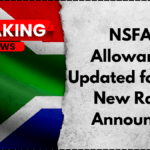South African drivers are set to navigate a fresh set of regulations starting in July 2025. The Department of Transport has finalized a series of adjustments that will impact both urban and rural motorists. With this SA traffic law update, authorities aim to improve road safety, reduce congestion, and streamline driver accountability.
Below is a breakdown of the key changes and how they will affect everyday driving. If you’re behind the wheel, this is a must-read for staying compliant.

What’s Changing in July 2025?
The primary changes coming with the Road Rules Changing July 2025 focus on stricter enforcement and broader driver responsibilities. Among the most significant updates:
- Mandatory Dash Cams for Public Transport: Taxis, buses, and ride-hailing vehicles must install certified dash cams. Footage must be stored for 90 days.
- Zero Tolerance for Distracted Driving: Holding a mobile phone while driving will result in an immediate fine and a 3-point demerit.
- Updated Speed Regulation Zones: Suburban zones will now cap speeds at 40 km/h, with increased fines for exceeding limits by even 5 km/h.
- New Testing Standards for Learner Drivers: Learner drivers will now be required to pass a real-world driving scenario in addition to the standard yard test.
- Digital License Cards Rollout: SA is introducing smart license cards with biometric authentication starting in Gauteng.
Key Road Rule Changes Effective July 2025
| Rule Change | Description | Applicable To |
|---|---|---|
| Dash Cam Requirement | Mandatory for public transport and e-hailing drivers | Commercial Vehicles |
| Phone Usage Crackdown | Immediate fines and license demerits | All Drivers |
| Revised Speed Limits | Suburban zones now 40 km/h max | General Public |
| New Learner Test Format | Includes real-life road situations | Learner Drivers |
| Digital License Cards | Biometric cards to replace old system | Phase 1: Gauteng |
How This SA Traffic Law Update Affects Everyday Driving
These updates are designed to shift behavior, not just enforce penalties. With the new dash cam rule, for instance, the government hopes to curb aggressive driving and provide better incident documentation. The move to biometric digital licenses also aims to combat document fraud, a growing concern over the last decade.
For average commuters, the biggest change will likely be the tougher mobile phone enforcement. Until now, many drivers ignored mobile phone laws due to lax oversight. With the new camera-aided policing tech rolling out, violations will be tracked more accurately, and fines will be auto-issued.
Why These Driving Changes Are Being Made
South Africa’s roads are among the most dangerous in the world. The government attributes much of this to outdated laws, poor compliance, and a lack of real-time monitoring. The driving changes coming in July 2025 aim to curb the rising toll of crashes and bring South Africa in line with global road safety practices.
Also, the overhaul supports President Ramaphosa’s 2022 commitment to halve road deaths by 2030. As of June 2025, several pilot programs already show a 15% drop in speeding violations in test zones where digital enforcement was deployed.
What Drivers Should Do Before July
If you drive for work or leisure, take proactive steps now:
- Verify your vehicle’s compliance with upcoming camera and tech requirements.
- Book a refresher driving course to brush up on new suburban speed limits.
- Learners should schedule tests before July if they want to avoid the stricter testing format.
- Sign up for the smart license card pre-registration (available online in Gauteng).
Conclusion
The Road Rules Changing July 2025 mark one of the most sweeping reforms to South African road laws in over a decade. These new rules are not just administrative tweaks; they’re foundational shifts in how road safety and driver responsibility are managed. Drivers who stay informed and adapt early will benefit from smoother transitions and fewer penalties. As South Africa moves toward smarter, safer roads, compliance becomes more than a duty—it’s a contribution to public well-being.
FAQs
What happens if I don’t install a dash cam by July 2025?
Public transport drivers without a compliant dash cam will face fines and possible vehicle impoundment.
Will all drivers need a digital license card immediately?
No. The rollout starts in Gauteng in July and will expand province by province through 2026.
Can I still use hands-free phone systems?
Yes, hands-free devices are permitted, but any handheld phone use while driving is prohibited.
How much will the smart license cost?
Final fees are expected to be announced in late June 2025, but estimates suggest R350-R500 per card.
Are the speed limit changes nationwide?
Yes, but municipalities may set stricter limits for school zones and high-density areas.
For More Information Click Here



